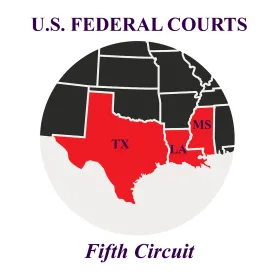On November 4, 2021, three states, Louisiana, Mississippi, and Indiana, filed suit against the federal government seeking to invalidate President Biden’s September 9, 2021, executive order requiring government contractors to be fully vaccinated against COVID-19 by January 18, 2022. On December 15, 2021, Judge Drell of the Western District of Louisiana granted the plaintiffs’ motion for preliminary injunction, stopping the vaccine mandate from going into effect in Louisiana, Mississippi, and Indiana. This Louisiana federal court order follows similar orders previously issued by federal courts in Georgia and Kentucky.
In light of the recent ruling in Louisiana and several other states, the Biden administration’s vaccine mandate for government contractors remains in limbo as it maneuvers through the appellate process. The mandate is sure to face additional legal challenges across the country. It is important then for federal government contractors working in Louisiana and elsewhere to stay up to date on these changes as courts issue further rulings on the mandate.
Background on the Vaccine Mandate for Government Contractors
President Biden signed Executive Order 14042 on September 9, 2021, which directed the Safer Federal Workforce Task Force to issue guidance on adequate COVID-19 safeguards for federal government contractors and subcontractors.[1] On September 24, 2021, the Task Force issued guidance pursuant to Executive Order 14042 requiring all covered contractors to be fully vaccinated against COVID-19 by January 18, 2022, unless entitled to a legal accommodation.[2] The executive order also directed the Federal Acquisition Regulatory Council (FAR Council) to amend the Federal Acquisition Regulation to include compliance with the Task Force’s COVID-19 guidance. And on September 30, 2021, the FAR Council published a memo to different federal government agencies on how and when to use the new contract clause implementing the COVID-19 guidance.[3]
Federal Courts Including Louisiana that Have Enjoined President Biden’s Vaccine Mandate
The first federal court to enjoin the vaccine mandate was the Eastern District of Kentucky. But that court’s November 30, 2021, order only applied in Kentucky, Ohio, and Tennessee.[4]
On October 29, 2021, a lawsuit was filed by several states, including Georgia, Alabama, Idaho, Kansas, South Carolina, Utah, and West Virginia, and the governors and various agencies and entities of those states, including the University System of Georgia. Shortly after filing suit, the states requested a preliminary injunction to suspend enforcement of the vaccine mandate. The state plaintiffs were joined by the Associated Builders and Contractors, Inc. (ABC), a national construction trade organization, and its local chapter, ABC of Georgia, which filed a motion to intervene as plaintiffs and also requested a preliminary injunction.
The Georgia federal court entered a preliminary injunction on December 7, 2021, which was similar to the injunction issued by the Kentucky federal court on November 30, 2021.
However, ABC’s intervention persuaded the Georgia federal court to broaden the scope of the injunction nationwide rather than limit it to a few states or only the Southern District of Georgia. Judge Baker emphasized that limiting the court’s injunction would not provide ABC’s nationwide membership with relief on covered contracts in other states and would lead to unwieldy results and more confusion for contractors.
Next, on December 15, 2021 — just eight days after the order issued in Georgia — Judge Drell of the Western District of Louisiana granted an injunction against the vaccine mandate in favor of three states, Louisiana, Mississippi, and Indiana. But the Louisiana federal court limited the order to contracts and grants between the federal government and the plaintiff states.[5] The court stated that the plaintiffs were not joined by any private contractors and, accordingly, it could not extend the scope to private contracts. The court further stated that it did not consider the distinction between public and private contracts in light of the nationwide injunction for private contracts imposed by the Southern District of Georgia.
The Cases Are on Appeal
On December 9, 2021, the federal government filed its notice of appeal and an emergency motion to stay the Georgia federal court’s preliminary injunction pending appeal to the US Court of Appeals for the Eleventh Circuit in Atlanta.
On December 17, 2021, the Eleventh Circuit denied the federal government’s request for a stay of the Georgia court’s preliminary injunction. In its ruling, the Eleventh Circuit stated that the federal government failed to show that it would suffer irreparable harm without a stay of the preliminary injunction. However, the court expedited the briefing schedule for the federal government’s appeal, and set the case for its next available oral argument.
In response to the nationwide injunction, the Office of Management and Budget issued revised guidance for contractors to comply with Executive Order 14042.[6] The guidance states that the federal government — at this time — will not take any action to enforce the vaccine mandate for government contractors working in all 50 states, the District of Columbia, and any of the territories and outlying areas identified in the guidance. The guidance also states that other COVID-19 safety protocols issued pursuant to Executive Order 14042 will continue to apply.
[1] 86 Fed. Reg. 50,985-88 (Sept. 9, 2021).
[2] The Biden administration’s guidance defines “covered contractor” as “a prime contractor or subcontractor at any tier who is a party to a covered contract.” Safer Federal Workforce Task Force, COVID-19 Workplace Safety: Guidance for Federal Contractors and Subcontractors, at p. 3 (last visited Dec. 14, 2021).
[3] FAR Council Guidance (last visited Dec. 14, 2021).
[4] Kentucky v. Biden, No. 3:21-cv-55, 2021 U.S. Dist. LEXIS 228316, at *44 (E.D. Ky. Nov. 30, 2021).
[5] Louisiana v. Biden, No. 1:21cv3867, 2021 U.S. Dist. LEXIS 240865, at *6 (W.D. La. Dec. 15, 2021).
[6] OMB Guidance for Federal Contractors (last visited Jan. 3, 2022).






 />i
/>i

